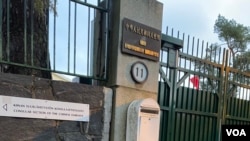The deployment of so-called “consular volunteers” by China’s diplomatic missions overseas is raising concerns among some analysts and watchdogs who see them as part of the Communist Party’s “long arm” abroad and fear they could be used to monitor dissent – something Beijing denies.
“They are not ‘spies’ per se, as they do not directly carry out espionage etc. But they do act on behalf of a foreign influence,” said Chung Ching Kwong, co-author of a recent report on consular volunteers by the Europe-based rights group Safeguard Defenders.
“They can still operate and help the authorities to target dissidents, like collecting personal info of people who are in touch with them or mobilizing people to attend protests,” she told VOA by email.
The Safeguard Defenders report came in the wake of new regulations on “consular protection and assistance” from China’s State Council that took effect in September.
Chinese government websites show how the consular volunteer network has spread over the years, with notices on recruitment, training and award ceremonies in Japan, Finland, Italy, France, Angola, Malaysia, the Czech Republic, Botswana and numerous other countries.
In South Africa’s economic hub, Johannesburg, the Chinese Consulate General hosted an annual meeting for more than 20 consular volunteers in July.
In his remarks to the volunteers, General Consul Tang Dongzhong said he hoped the volunteers would help the Consulate General “to build ‘The Five-Sphere Integrated Plan’ joint defense and joint protection system, and make unceasing efforts to safeguard the safety and legitimate rights and interests of Chinese citizens.”
According to Chinese government websites, the “five-sphere integrated plan” was announced in 2012 and is meant to advance “socialism with Chinese characteristics encompassing economic, political, cultural, social and eco-environmental development.”
China’s response
Contacted by VOA, the Chinese Embassy and consulate in South Africa did not reply to repeated requests for comment. But the Chinese government has defended itself from criticism of its consular volunteer network in the past.
In Canada, a spokesperson for the Chinese Consulate General of Vancouver said in 2019 that Chinese citizens traveling to Canada had experienced “accidents, sudden illnesses, and telecommunications fraud and other criminal violations.”
The spokesperson added that it is “reasonable to hire local overseas Chinese as consular assistance volunteers to assist the Consulate General in providing timely and effective assistance to overseas Chinese citizens in need in accordance with laws and regulations.”
After the publication of the Safeguard Defenders report, a spokesperson for the Chinese Embassy in Brussels hit back, saying there was nothing nefarious about the volunteer system.
“To handle cases related to Chinese citizens in a timely and effective manner and to serve public good, some compassionate Chinese compatriots living and working in Belgium have voluntarily offered necessary assistance to the embassy in providing consular protection,” the spokesperson said.
“When providing voluntary service, they have strictly observed local laws and regulations. Such service does not involve exercising consular functions.”
Information and even recruitment calls for volunteers are public on Chinese government websites.
“We urge relevant press and ‘NGO’ to be objective and fully understand the benevolent nature of the consular assistance volunteer service, stop spreading disinformation, and refrain from acting as mouthpieces for China-related lies and rumors,” the Brussels embassy spokesperson said. “There are similar practices by other countries as well.”
The United States has what it terms “Citizen Liaison Volunteers,” who help U.S. embassies help their citizens abroad. Mentions of such programs appear on several U.S. Embassy websites, including the one for China.
A description of the role on the website of the U.S. Embassy and Consulates in China reads, “CLVs are private citizens who help the embassy help U.S. citizens in need. They assist travelers in distress, help us track down missing U.S. citizens, and, in the event of a natural disaster or other emergency, help us locate other American citizens so we can help get them to safety.
“Most often, however, CLVs are called on to be our ‘eyes and ears’ in the community,” it says.
United front
Some analysts however, see the role of China’s volunteers as a potential threat. Niva Yau, a fellow at the Atlantic Council’s Global China Hub, recently wrote that by expanding its global security footprint overseas, China could “also grow its capacity to carry out transnational repression.”
She said the new regulations introduced in September, “could provide formal grounds for PRC consulates to intervene in the overseas private affairs of Chinese nationals whether they welcome government support or not.”
Both the Safeguard Defenders and the Atlantic Council reports advise host nations to ensure China does not use its embassies and consulates to infringe on the rights of Chinese abroad or to build a larger foreign security presence.
Safeguard Defenders has previously detailed how China has more than 100 “police stations” overseas to monitor, coerce and even sometimes forcibly repatriate Chinese living in exile.
Paul Nantulya, a research associate at the Africa Center for Strategic Studies, a Washington-based policy institute, said the consular volunteer program is essentially part of the Chinese Communist Party’s wider network of influence known as the United Front.
“This consular volunteer program is part of the United Front system. … And it is basically part of what one might call influence operations,” he told VOA.
"These are efforts that are undertaken to amplify Chinese policies, mobilize support for Chinese positions, influence policies of host countries through an indirect approach, which is very difficult to actually attribute, because it is mostly non-official and it is very diverse.”
Nantulya said China finds the volunteers useful because its diplomats “don’t have the capacity to monitor everything that goes on in their countries of jurisdiction.”
“But there're other motivations as well,” he said. The work of the United Front is very clear; it seeks to build affinities with China -- to discredit China's adversaries.”
VOA's Mandarin and Cantonese Services, including Kris Cheng contributed to this report.




